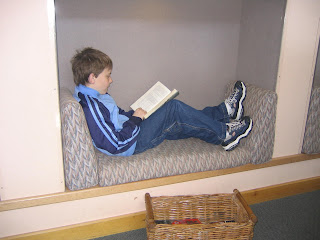 Every Tuesday The Albuquerque Journal, our local independent newspaper, features a "Schools" section on the front of Section B. One of the regular features is a syndicated column called A+ Advice for Parents, in which the columnist, Leanna Landsmann, dispenses advice to parents about various educational issues in response to questions posed by readers.
Every Tuesday The Albuquerque Journal, our local independent newspaper, features a "Schools" section on the front of Section B. One of the regular features is a syndicated column called A+ Advice for Parents, in which the columnist, Leanna Landsmann, dispenses advice to parents about various educational issues in response to questions posed by readers.
Being somewhat cynical about public education, I sometimes wonder if the questions are staged, but whether or not they are, the advice dispensed is definitely inside the envelope of educational culture. Parents are cast as the problem, and the educational experts know exactly how to solve them.
Today's column was no exception to educational politics as usual. The question, supposedly posed by a teacher, reads thus:
"Our children are falling behind in reading, and many parents are clueless...A mother asked me what kind of video game to buy her son for Christmas that would help him read better, I suggested she buy him books. Her response? 'But he doesn't like to read.' Parents need to get smarter about this crisis..."
The columnist addresses the question by citing a recently released study by The National Endowment for the Arts (NEA--not the teacher's union), called To Read or Not to Read: A Question of National Consequences. The findings discussed in A+ Advice for Parents in the paper include the following:
- less than 50% of children under 5 are read to by family members (actual number not given)
- the number of books in the home is a "significant predictor of academic achievement
- Children and teens who read for pleasure daily or weekly score higher on reading tests

My reaction to reading these extremely original findings was something along the lines of "Well, duh!" In science we call these 'No Sh-- Sherlock' finding. The findings are not what intrigued me about the article. They are predictable, as are quotes from the NEA spokeswoman who, when she wasn't moaning "ain't it aweful" was busy telling us what parents "should" do. To wit:
"Our study points out several alarming national trends, yet we hope it makes a strong case for why parents should make reading for pleasure part of a family's life."
Well, duh.
What interested me about the article and the study was what they didn't address. In the question at the beginning of the article, we are told that teacher says that a parent says that a student "doesn't like to read."
The obvious question is, 'Why don't kids like to read?'
Neither the columnist nor the NEA study address that question. Oh, the usual culprits are trotted out and blamed: Television, video games, iPhones, computers. And yet to use most of this technology, a person has to be able to read. And of course, parents are targeted. School people would have you believe that it is all the parent's fault. They do it to their kids and then the poor schools have to pick up the pieces.
But let's ask some questions that take us beyond educational finger-pointing as usual.

What is it that makes people "readers", anyway? Here the study gives us information that has been known for a long time. The answer does partly lie in the home. Kids who grow up with parents who read, and who read to them, in homes with a plethora of books, are kids who grow up to be readers.
But this information just begs the question: Why aren't the parents readers? Why don't they read to their kids? Why are there fewer books in American homes?
Could it be that the parents don't like to read either? If this is so, we are merely pushing the question back a generation.
I do not have study results on this question of why people who can read don't like to read. But I have a suggestion. Love of reading comes from the experience of pleasure in reading and the pleasure in finding things out. Yes, it's circular to some extent. It's one of those maddening 'which came first, the chicken or the egg' type of questions.
As John Taylor Gotto points out in an essay in A Different Kind of Teacher, the people of the United States once were "readers." Even during colonial times, when a hefty percentage of the people were indentured servants, the literacy rate was high, and books were eagerly passed from hand to hand. And these books were not Dr. Seuss (no insult intended). They were hefty books with complex language. Books like the King James Bible, Shakespeare's plays and sonnets, John Bunyan's A Pilgrim's Progress. Hard books. Books that have long sentences with subordinate clauses, flowery verbal imagery, and impressive vocabulary. The average American was a "reader." As DeToqueville pointed out in Democracy in America, (published in the first half of the 19th century), the average American farmer or worker, read more than most members of the European landed gentry.
So what happened? Why do schoolchildren today, and their parents, forgo the pleasure of reading? Why don't they like to read?
I have an hypothesis. I think that school has become the problem. And that the problem is two-fold with origins in reading instruction and in the creeping conquest of family life due to school policy.

When I say that reading instruction is a problem, I am not talking about the reading wars. I refuse to fight the phonics v. whole language reading instruction battle. Both are needed, and both are important. To read well, a child needs to be exposed to the rich and imaginative use of the English language (for more on this see E.D. Hirsch's explanation of 'the Matthew effect' in The Schools we Need or check it our here--just scroll down to number 3, Education). Most kids also need some instruction in phonics. However, if reading instruction never gets beyond phonics worksheets and inane copy, if it never acquaints the child with good books, the child will not enjoy reading. For many kids, as Hirsch points out, "reading" means being forced to fill out endless vocabulary lists, spelling tests, and book reports while good books remain on the shelves at the periphery of the classroom. As I have said before, it is like making a kid who wants to learn to ride a bike fill out worksheets detailing the parts of the bike, giving them spelling tests to see if they can spell "pedal" and "brake" correctly, and having them memorize all three hundred and fifty-two separate steps that go into riding a bike (just kidding--I don't know how many steps there are), but never once getting the kid on the bike and running along side them!
If a person learns to love reading by getting pleasure out of reading, this reductionist methodology is never going to make "readers." And yet, this has become the methodology for kids who may not be reading "on schedule." They are deprived of recess, the fun stuff about reading, and dragged off the "drill and kill" remediation.
 The other problem, and in my mind, perhaps far more important is the school policy take-over of family life after school hours. There has been numerous, well-designed studies done over the past 100 years that demonstrate that busy work assignments (read homework) do not appear to improve educational outcomes over the years of a child's education. What is it that actually improves outcomes? Number one: time spend conversing with parents. Remember all those studies that show that family dinners are important? Number two: time spent reading with parents. They mean actually reading, here, not making a diorama out of shoebox about reading. But what has happened? Students receive more and more thoughtless and useless busy-work assignments as homework, because the schools are preoccupied with testing, and shunt actual instruction to the parents for after-school hours. And there goes time for reading for pleasure at home.
The other problem, and in my mind, perhaps far more important is the school policy take-over of family life after school hours. There has been numerous, well-designed studies done over the past 100 years that demonstrate that busy work assignments (read homework) do not appear to improve educational outcomes over the years of a child's education. What is it that actually improves outcomes? Number one: time spend conversing with parents. Remember all those studies that show that family dinners are important? Number two: time spent reading with parents. They mean actually reading, here, not making a diorama out of shoebox about reading. But what has happened? Students receive more and more thoughtless and useless busy-work assignments as homework, because the schools are preoccupied with testing, and shunt actual instruction to the parents for after-school hours. And there goes time for reading for pleasure at home.
My guess is that the parents of young children today do not like to read for the same reasons that their kids don't like to read. And the answer isn't to shake a finger at these parents and tell them that when their kids are done with 3-4 hours of homework a night, then they should read with them. Replace the busy-work with...nothing. Let the parents determine how they will spend time with their kids. Return the power to the family.
Of course, I am preaching to the choir here. Homeschoolers have not waited for the schools to return power to the family. They have taken their power back.
And I have yet to meet homeschooled kids who do not like to read. They may learn to read early or late. But all of them appear to like books and like the idea of reading.
What's that, N? Oh, gotta go! The Dangerous Book for Boys is calling.































































 The other problem, and in my mind, perhaps far more important is the school policy take-over of family life after school hours. There has been numerous, well-designed studies done over the past 100 years that demonstrate that busy work assignments (read homework) do not appear to improve educational outcomes over the years of a child's education. What is it that actually improves outcomes? Number one: time spend conversing with parents. Remember all those studies that show that family dinners are important? Number two: time spent reading with parents. They mean actually reading, here, not making a diorama out of shoebox about reading. But what has happened? Students receive more and more thoughtless and useless busy-work assignments as homework, because the schools are preoccupied with testing, and shunt actual instruction to the parents for after-school hours. And there goes time for reading for pleasure at home.
The other problem, and in my mind, perhaps far more important is the school policy take-over of family life after school hours. There has been numerous, well-designed studies done over the past 100 years that demonstrate that busy work assignments (read homework) do not appear to improve educational outcomes over the years of a child's education. What is it that actually improves outcomes? Number one: time spend conversing with parents. Remember all those studies that show that family dinners are important? Number two: time spent reading with parents. They mean actually reading, here, not making a diorama out of shoebox about reading. But what has happened? Students receive more and more thoughtless and useless busy-work assignments as homework, because the schools are preoccupied with testing, and shunt actual instruction to the parents for after-school hours. And there goes time for reading for pleasure at home.





